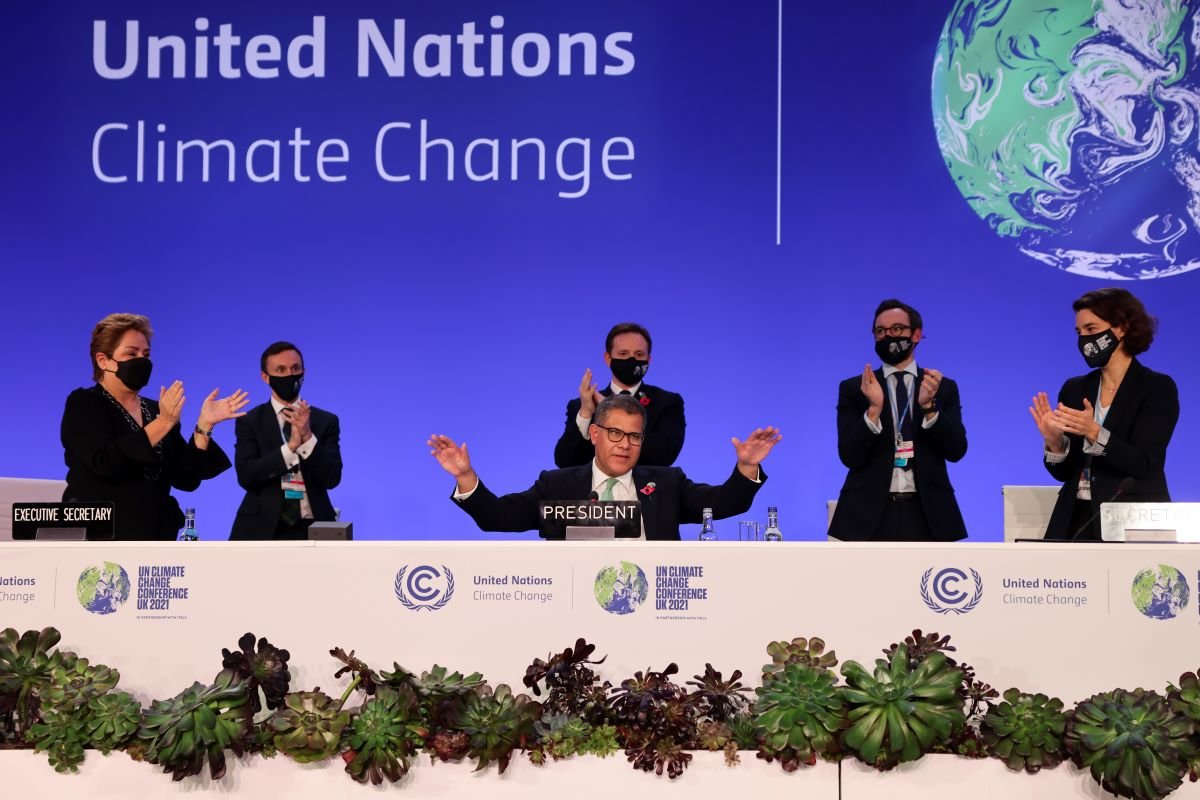COP26 has ensured that coal power generation is on the conveyor belt heading to the great trash compactor of history. Further actions in 2022 can speed up its exit.
Through adopting the Glasgow Climate Pact, all countries have now explicitly recognised that the transition from coal power to clean energy must be accelerated. The UK’s efforts to put coal centre stage in Glasgow have been vindicated.
The final hours of drama followed 15+ years of efforts by civil society campaigners who have challenged coal power at every level from building site to boardroom, and from policy processes to global politics. The COP26 agreement was built on the foundations of their dedication, commitment, and people power.
From Paris to Glasgow
When the Paris Agreement was signed in 2015, the UK was the sole national government to have committed to phase out coal power generation. In the six years since, the global pipeline of planned coal projects has collapsed by 76%, avoiding the construction of another China’s worth of power plants: No New Coal is now the norm. Similarly, retirements have been gathering pace across the OECD, with over 55% of power plants either closed since 2010 or set to retire by 2030. These positive real world trends have prepared the way for a political breakthrough.
As COP26 drew closer, 2021 saw coal exit discussed for the first time by leaders at both G7 and G20. Combined diplomacy from the UK and Italy helped secure commitments to end overseas public coal finance, including from China, Japan, and South Korea. Yet just ahead of Glasgow, the G20 summit in Rome saw governments refuse to recognise that an end to coal power generation was required.
When the Paris Agreement was signed in 2015, the UK was the sole national government to have committed to phase out coal power generation. In the six years since, the global pipeline of planned coal projects has collapsed by 76%
The UK had proclaimed its priorities of ‘Coal, Cars, Cash, and Trees’. It wanted to showcase real world progress in parallel to the formal business of the ongoing implementation of the Paris Agreement. So coal was centre stage for Energy Day in Week 1 of the Glasgow gathering. Ultimately, the UK’s approach paid off, as despite the messy messaging, there was positive progress and significant substance.
Down and Out
Surprisingly, coal reappeared in the Week 2 end game, when the formal approval of the Glasgow Climate Pact saw coal as the central topic. The UK had tried its luck by proposing text that recognised the need for a phase out of coal power generation and fossil fuel subsidies. Amazingly it survived three rounds of edits. Then came the final ultimatum: China and India signalled they would not sign on.
Following a frantic hour of real time negotiation, two compromises were reached to secure agreement. On coal, the language changed from ‘phase out’ to ‘phase down’, while the clause on fossil fuel subsidies recognised the need for ‘targeted support to the poorest and the most vulnerable according to their national circumstances’. Despite complaints from other parties regarding the process and the content, the edit was approved. COP26 named coal as the fossil fuel that needs to exit first and fastest.
If it had been suggested ahead of COP26 that the Glasgow Climate Pact would include language proposed by India and China on ‘phasing down coal’ it would have been laughed out of town as impossible. Both countries are still seeing coal use going up – a commitment to ‘down’ is a huge initial step. Ahead of the final edit, many governments had already accepted for the first time the original destination language of ‘phase out’, including major coal exporters Australia, Indonesia and Colombia. The wind of change really is blowing the world from coal to clean energy.
On their return home from Glasgow, all governments will need to plot a trajectory for the pathway out of coal, while investors will be clamouring to get their money out.
Saturday’s dramatic and historic conclusion to COP26 resulted in an unprecedented recognition by all parties of the necessity of moving away from fossil fuels, starting with coal power generation. This is long overdue but very welcome. On their return home from Glasgow, all governments will need to plot a trajectory for the pathway out of coal, while investors will be clamouring to get their money out.
Data trends and political commitments have now converged. Efforts during 2021 have turned off the tap of coal finance, while COP26 has opened a new chapter of action to accelerate the retirement of existing coal power plants. The world now faces a decade of delivery to accelerate coal’s demise and expand efforts to oil and gas too. The UK Presidency has only just begun: 2022 will see continued focus on consigning coal to history.

